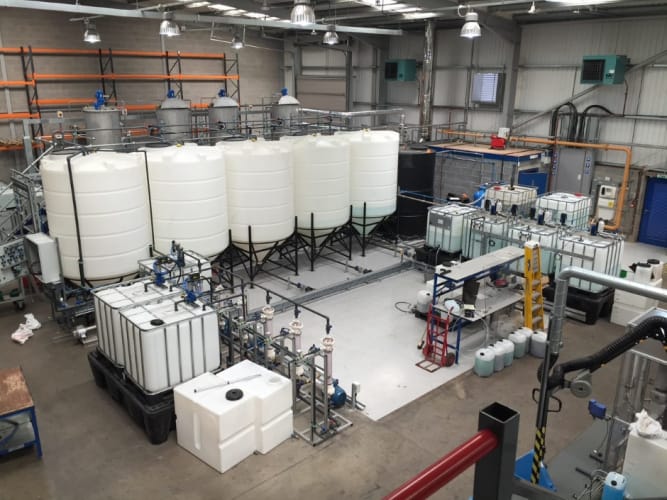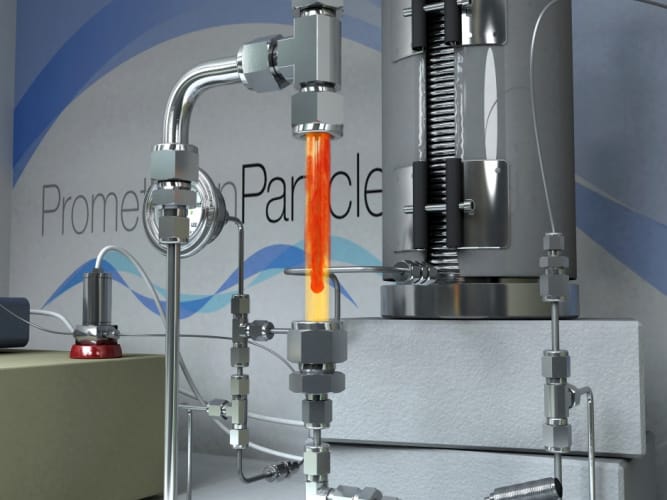
Collaborate to Innovate 2019
Category: Manufacturing Technology
Winner: SHYMAN - Sustainable Hydrothermal Manufacturing of Nanomaterials
Partners: University of Nottingham with Promethean Particles and others
Category Sponsor: Mazak
Radio frequency identification (RFiD) tags are a key underpinning technology for the so-called Internet of Things.
But the high cost of producing one of the key raw materials for these tags - silver nano-particles - is holding back the full potential of the technology. University of Nottingham spin out Promethean Particles hopes to change this.
Promethean is the outcome of a consortium of 18 industry and academic partners across Europe that developed the SHYMAN project (Sustainable Hydrothermal Manufacturing of Nanomaterials) winning a €10m EU Framework 7 grant to develop a cleaner process to manufacture nanomaterials in large volumes.
These tiny particles, that can measure less than one billionth of a metre, are used in the manufacture of inorganic and organic pigments and metal nanomaterials, which are used in industrial applications including printed electronics, Metal Organic Frameworks (MOF), catalysts, healthcare and nanocomposites, including plastics and coatings.
READ ABOUT THE OTHER C21 2019 WINNERS
SHYMAN has led to Promethean, building the largest multi-material nanoparticle plant in the world in Nottingham. The process – a continuous, sustainable hydrothermal synthesis of high-quality inorganic nanoparticles – uses hot water rather than potentially hazardous chemicals to fabricate the nanoparticles.
Crucially, the process has been successfully scaled up, and the working plant is able to produce up to 200kg of nanoparticles per hour. It now produces 1,000 tonnes of nanomaterials a year, making it viable for commercial supply to chemical and industrial companies including Solvay, Fiat and Repsol.
“The technology had come to light nearly 20 years ago but the synthetic chemistry community had written it off as impractical,” said Professor Ed Lester, lead academic on SHYMAN and technical director at Promethean Particles
In 2016, SHYMAN won a European Commission grant worth €10m, with €2m to build a plant with the capacity to make 100 tonnes a year. “But we scaled it 10 times bigger than we were awarded the money for. That was an interesting financial challenge,” said Lester. “We wanted to derisk the technology completely because even with 100 tonnes you would still get naysayers that would doubt you’d be able to reach 1,000 tonnes volume.”
Whilst most chemical plants are designed to make one specific product Promethean is capable of producing many variants of nanomaterial that can currently be developed at bench scale.
As well as pulling expertise from large chemicals firms like Solvay, universities from Ireland, Spain, the Czech Republic and Poland were involved. The full consortium also included materials developers (UniPress), modellers (Universidad del Valladolid), analytical specialists (PR associates), formulators (VLCI) and end-users, covering the total value chain.
Marie Ticha from the Czech Technical University, who worked on modelling the sustainability of the process, said “[Our university] was responsible for providing environmental impact assessment not just on the production technology, but also on selected applications of nanomaterials throughout their life cycles using Life Cycle Assessment (LCA) methodology. Our cooperation with the University of Nottingham and other European partners within the SHYMAN project significantly improved our experience in this field, which was positively reflected both in the work with students and in cooperation with Czech companies engaged in the production of nanomaterials.”

The process
Continuous hydrothermal synthesis produces nanoparticulate materials by mixing superheated or supercritical water flow with an aqueous flow containing a dissolved metal salt. So rather than slowly heating the entire contents of a batch vessel (called batch hydrothermal synthesis), two fluids are continuously mixed together. The problems around this process were solved during years of research at the University of Nottingham and the reactor configuration necessary for continuous production was demonstrated at bench (g/hr) and pilot scale (kg/day) before the SHYMAN project began.
Continuous hydrothermal synthesis offers a true alternative to other, chemical-intensive production methods because it is a genuinely continuous process and is chemically more benign.
Markets and impact
Among other nanoscale-products, Promethean is producing a copper ink for flexible circuitry and 3D printing. This has been a key part of moving from silver-based RFiD tags to copper, which is about 1/20th the cost of silver at wholesale prices. “A company in Japan is talking about making one billion RFID tags, that’s just one client,” says Lester.
Another big market is that for metal organic frameworks, whose applications include adsorbents like toxic chemicals, gas separation and drug delivery. The potential market value for all these nanomaterials is hundreds of billions of dollars, said Lester.
From a personal perspective, Prof. Lester is proud of what SHYMAN has achieved. “This technology was described as the ‘Holy Grail’ by a senior person working in the catalyst field. People had tried it and written it off because it was so difficult.”
The Manufacturing Technology category is sponsored by Mazak
The headline sponsor for C2I 2019 is Frazer-Nash Consultancy











Radio wave weapon knocks out drone swarms
Probably. A radio-controlled drone cannot be completely shielded to RF, else you´d lose the ability to control it. The fibre optical cable removes...